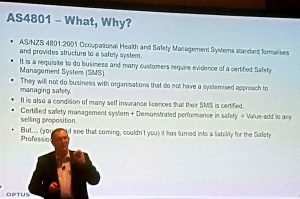 Last week Optus’ Director of Work Health and Safety, Geoff Hoad, spoke enthusiastically of the new international occupational health and safety (OHS) Standard ISO45001 as a “gamechanger”. It is a gamechanger as much as any management Standard can be, which is, in reality, as much as any company allows it to be. Hoad’s presentation included other comments, some that were not kind to the OHS profession.
Last week Optus’ Director of Work Health and Safety, Geoff Hoad, spoke enthusiastically of the new international occupational health and safety (OHS) Standard ISO45001 as a “gamechanger”. It is a gamechanger as much as any management Standard can be, which is, in reality, as much as any company allows it to be. Hoad’s presentation included other comments, some that were not kind to the OHS profession.
Hoad was scathing about the current Australian OHS management Standard

 In support of this year’s election of new Board members to the
In support of this year’s election of new Board members to the  The community and media responses to the
The community and media responses to the 
 It was
It was  There is much general discussion about the
There is much general discussion about the 